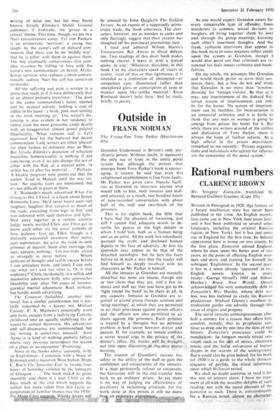Outside in
FRANK NORMAN
The Frying-Pan Tony Parker (Hutchinson 45s) Grendon Underwood is Britain's only psy- chiatric prison. Without doubt, it represents the only ray of hope in the entire penal system but, although the picture that emerges from Tony Parker's book is encour- aging, it cannot be said that even this enlightened establishment is free from faults. Mr Parker was given carte blanche facili- ties at Grendon to interview anyone who would talk to him, both inmates and staff, and amassed, as a result, two hundred hours of tape-recorded conversation with about half of the staff and two-thirds of the prisoners.
This is his eighth book, the fifth that I have had the pleasure of reviewing, and still I cannot find adequate words to de- scribe his genius or the high esteem in which I hold him. both as a human being and as an artist. All his work has relentlessly pursued the truth, and disclosed human dignity in the face of adversity. At first his approach may appear to be that of the detached sociologist, but he lays the facts before us in such a way that the reader will find himself as deeply involved with his characters as Mr Parker is himself.
All the inmates at Grendon are mentally disturbed but none are insane, though one or two claim that they are, and a few in- mates and staff say that you have got to be 'right round the bend' to be there at all, in any capacity. Inmates at Grendon are re- quired to attend group therapy sessions and 'wing meetings', at which they are permitted to air their grievances against prison officers and the officers are also permitted to air theirs against the prisoners. Each prisoner is treated by a therapist but no personal problem is kept secret between doctor and patient. If, for example, an inmate confides
a secret sexual urge in the privacy of the doctor's office, the matter wilt be -brought out into open discussion, at the-.next group meeting.
The essence of Grendon's success lies solely in the ability of the staff to gain the confidence and cooperation of the inmates.
If a man persistently refuses to cooperate, the Governor will in the end transfer him back to an ordinary prison. As yet there is no way of judging the effectiveness of psychiatry in reclaiming criminals, for the work done at this prison is still no more -
As one would expect. Grendon caters for every conceivable type of offender, from murderers to conmen, sexual deviants to burglars. all living together cheek by jowl and, through the group meetings, knowing each other's innermost thoughts. And the frank, verbatim interviews that appear in this book must in some measure reflect credit upon the system at Grendon. though I would also point out that criminals are re- nowned for their innate verbosity and boast- fulness.
On the whole, the prisoners like Grendon and would much prefer to serve their sen- tences there; but a few do not and think that Grendon is no more than 'window- dressing' for 'foreign visitors'. Be that as it may, any improvement of the diehard Vic- torian system of imprisonment can only be for the better. No system of imprison- ment can be faultless, for incarceration is an unnatural existence and it is futile to think that any man or woman is going to emerge from prison the better for it. But while there are writers around of the calibre and dedication of Tony Parker. there is always the hope of further reform. As a high official in the prison department remarked to me recently : 'Private organisa- tions and individuals who agitate for reforms are the conscience of the penal system.'


































 Previous page
Previous page